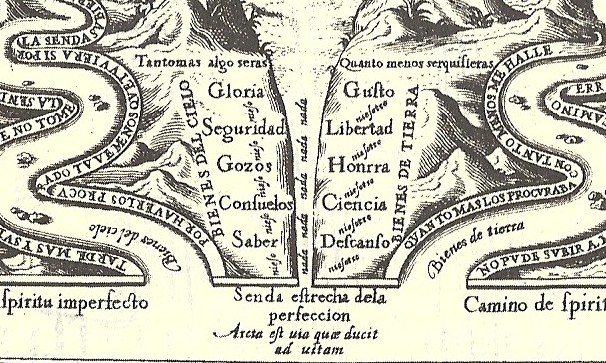St. John of the Cross is probably best known for his masterpiece on the spiritual life The Dark Night of the Soul. But it is his commentary and exposition on The Dark Night, entitled The Ascent of Mount Carmel, that is likely his most helpful work. In it, he describes three paths that souls may follow in their spiritual life. Two are wide, one is narrow. The two wide paths are labeled “the goods of heaven” and “the goods of earth.” The narrow path is labeled simply as “nothing.” Each of the paths aims to lead up the mountain to God, but only one path makes it. While the Christian knows that the goods of earth alone do not lead a soul to God, St. John of the Cross also dismisses the path of the goods of heaven. Only the path of nothingness leads us to God. And while it is a path with nothing on it, I think we can still use the benefit of a guide along the journey. And there may be no better guide than St. John of the Cross.
The goods of heaven and the goods of earth listed by St. John of the Cross compose a rather attractive list: rest, consolation, knowledge, joy, and glory. It is a collection of goods that would be hard to refuse. But, when goods other than God are sought, we are paradoxically unable to possess them. As he says, “The more I desired to possess them, the less I had.” When sought for their own sake, they lose what makes them truly good. For example, it is impossible to simply find joy. One must find it in something or someone else. In the spiritual life, when we desire not joy, but God, we end up possessing both. Or, as he puts it, “Now that I no longer desire them, I have them all without desire.”
But, the real goal remains ahead: God alone. St. John still serves as our guide. He is one who has gone through it and is showing us the way. He helps keep our gaze firmly on what is truly good and worthy of our love. But, this path of nothing is nonetheless full. It is filled with the witness, teaching, and prayers of saints. While we seek God alone, we know we are never alone: a cloud of witnesses surrounds us.
The example of numerous witnesses attests to the wisdom of St. John of the Cross. He has been a guide for such figures as St. Thérèse of Lisieux, St. Teresa Benedicta of the Holy Cross (Edith Stein), and Pope St. John Paul II. In fact, it was under the guidance of another great theologian, the Dominican master Fr. Garrigou-Lagrange, that a young Karol Wojtyla wrote a dissertation on the thought of St. John of the Cross. Fr. Garrigou-Lagrange had long been a proponent of the consistency of thought between the scholastic insights of St. Thomas Aquinas and the mystical ones of St. John of the Cross. It was with his consultation that St. John of the Cross was named a Doctor of the Church. And that “doctoral” status may be as good a reason as any to trust him as our guide.
✠
Image: El Monte Carmelo







